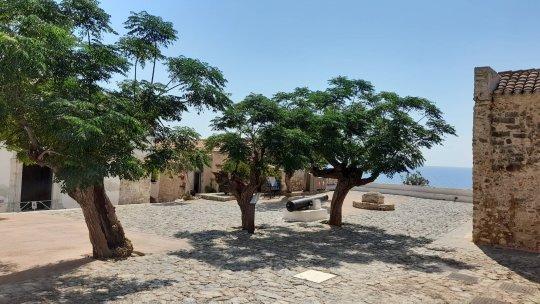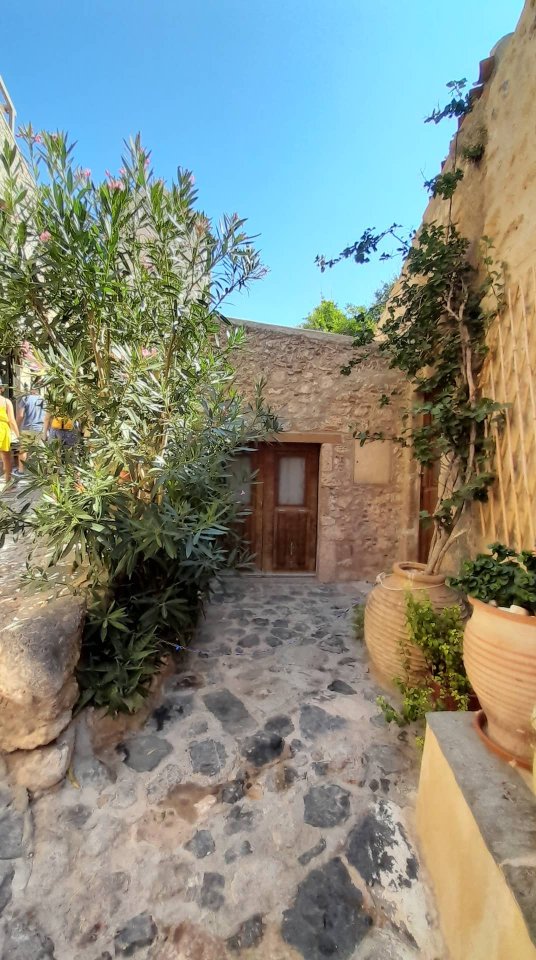#Rebetiko
Explore tagged Tumblr posts
Text

Ρεμπέτικο, το κακό βοτάνι
David Prudhomme (2010)
29 notes
·
View notes
Text

Sotiria Bellou and Christopher Lee, circa 1980
A journalist had been horrified when, upon coming into Bellou’s house for an interview, he caught sight of a framed picture of Dracula. “Don’t be scared now,” Bellou had soothed, “Dracula’s my fan!”, then went on to explain that Lee had been an avid collector of her records ever since the 1950s.
#sotiria bellou#christopher lee#rebetiko#best crossover episode in the history of the universe if you ask me
87 notes
·
View notes
Text
Sunday sounds: Φεύγω
We are very melancholic, Baby the Dog and I, in this postapocalyptic decor of boxes, bags of unwanted miscellanea and life shards. So I hope you will indulge me this uncharacteristic Greek interlude, with one of the finest rebetiko voices of the Nineties - Orfeas Peridis.
If you traveled with me in my beloved Peloponnese, on a very early, scorching sunny morning, you would probably hear some Haendel (of course and no matter the weather), but you would also probably hear this. My playlists are viciously eclectic, by the way, and I think Piaf comes next, on that one. Or The Proclaimers, never mind.
youtube
Φεύγω means 'I am leaving' and like all those rebetiko plaintive and devil may care songs, this one has its hefty amount of existential angst, unrequited feelings and dramatic narrative solutions. But this song will always remind me of Monemvasia, the Greek Gibraltar, Byzantine fiction precariously perched on a rock promontory:

I would move in there tomorrow, no second thoughts and damn all the consequences:

They do, after all, have one of the most beautiful parking lots on this planet:

Of course we won't do anything. Adventure awaits. But still, it's going to be ugly crying at the border and for Baby, his first contact with his real, international dog life.
58 notes
·
View notes
Text
youtube
Το μυστήριο ζεϊμπέκικο (1932)Ιωάννης Χαλικιάς (ή Τζακ Γκρέγκορυ)
Μικρασιάτικη μελωδία. Φωνογραφήθηκε στη Νέα Υόρκη, τον Ιανουάριο του 1932. Μπουζούκι παίζει ο Ιωάννης Χαλικιάς (ή Τζακ Γκρέγκορυ) και κιθάρα ο Σοφοκλής Μικελίδης. Δίσκοι Columbia Co 56294-F και DGX 36 (12΄΄). Την ίδια χρονιά φωνογραφήθηκε και στην Αθήνα από το Σπύρο Περιστέρη.Στη μελωδία αυτή ��ασίστηκε το τραγούδι "Μανταλιώ και Μανταλένα"με την Μαρίκα Παπαγκίκα
#Το μυστήριο ζεϊμπέκικο#1932#μελωδία#Ιωάννης Χαλικιάς#Τζακ Γκρέγκορυ#Μικρασιάτικο#Σοφοκλής Μικελίδης#μουσική#παράδοση#ρεμπέτικο#rebetiko#Asia Minor Rebetiko melody#Yannis Halikias#Sofoklis Mikelidis#bouzouki#guitar#Youtube
4 notes
·
View notes
Text


[yt: Mu Me Stelnies Mana Stin Ameriki]
[yt: M’ekapses Ameriki]
3 notes
·
View notes
Text
youtube
Σωτηρία Μπέλλου στον Διονύση Σαββόπουλο: "Αχ Διονύση με έκανες και τραγουδάω ποπ!"
Εγώ στη Σωτηρία Μπέλλου: "ΚΑΙ ΚΑΛΑ ΕΚΑΝΕ"
5 notes
·
View notes
Audio
(Vlasis Metaxas)
0 notes
Text
Singing rebetiko with the angels
As my post about Dimitris Mitropanos’s song Roza (https://wordpress.com/posts/wordscene.wordpress.?s=great+song+bu) has for some reason been generating a lot of interest recently, I thought I would translate another song in the zeïmbekiko style of the Greek rebetiko tradition – brilliantly performed here by Themis Adamantidis, Dimitris Mitropanos and Dimitris Basos. The lyrics, by the writer…
View On WordPress
0 notes
Text
#tourisme#travel#voyage#travels#Greece#Grèce#Athènes#Athens#Acropole#Parthénon#Plaka#evzones#Anafiotika#pita#gyros#souvlaki#rebetiko#île#Hydra#randonnée#canal de Corinthe#Némée#Mycènes#Nauplie#komboio
1 note
·
View note
Text








The last song that was written, the last lyrics that were written was (for) the song “Hooked.” It starts off with the line, “I’ve got the fear / I’ve got the human fear.” And I realize that so many of the songs had an underlying theme of fear to them. But not necessarily succumbing to fear, but more like overcoming fear. “The Doctor” is about the fear of leaving an institution, and “Bar Lonely” is the fear of leaving a relationship. “Night or Day” is the fear of committing to a relationship. But fear is fascinating because fear is universal. We all experience fear. We all experience the same fears. But how we respond to it is individual. And that’s how we find who we are, our personalities. And overcoming fear feels good. That’s why we watch horror films or ride rollercoasters — because you overcome fear and then feel very alive for having done so.
– Alex Kapranos on the story behind Franz Ferdinand's latest album The Human Fear for AP
#the human fear#franz ferdinand#probably not bye#音楽#new music#gif#my gifs#i'm having the time of my LIFE with this album#in the past 4 days alone i've listened to it so many times that i swear it's already imprinted in my dna#it's sosososooooo good !!! such a fun compact album !!!#in typical franz fashion almost every song goes in a direction you wouldn't expect#it's like a perfect mix of old & new!#the synthesizer & certain guitar riffs - even the way alex sings - recall some of their earliest songs into always ascending & beyond#like when i first heard cats ! ohhhhh#classic ff but it also reminded me of los bitchos !#yet something about it feels distinctly new too (a small touch of country perhaps?)#i adore everydaydreamer & the little ooohs#'don't put a good dream down' 😭#and if we're talking about lyrics then hellooo the birds !#ending an album all about fear with 'thank you for accepting me despite what i have done?? and the man that i've become???'#alex kapranos. your mind.#can't quite explain it but that song has SUCH a paul mccartney feel to it that i wholeheartedly endorse & love#also so excited by the rebetiko in black eyelashes! singing in greek!!!#one of the fan groups was kind enough to translate & share the phonetic pronunciation in english & spanish so we can sing along :')#which i will be doing this spring when they tour!!!#i can't wait to finally scream along to the doctor !#to experience tell me i should stay live ! (the buildup in that song is incredible & may very well be my favorite)#and to dance !!!!!!!!!#thank you ff what a way to start the year 😌
51 notes
·
View notes
Text
youtube
"'Misirlou' (Greek: Μισιρλού < Turkish: Mısırlı 'Egyptian' < Arabic: مصر Miṣr 'Egypt'[1]) is a folk song[2] from the Eastern Mediterranean region. The song's original author is unknown, but Arabic, Greek, and Jewish musicians were playing it by the 1920s. The earliest known recording of the song is a 1927 Greek rebetiko/tsifteteli composition. There are also Arabic belly dancing, Albanian, Armenian, Serbian, Persian, Indian and Turkish versions of the song. This song was popular from the 1920s onwards in the Arab American, Armenian American and Greek American communities who settled in the United States." —Orginal Wikipedia Article https://en.wikipedia.org/wiki/Misirlou
#but Arabic#Indian and Turkish versions of the song. This song was popular from the 1920s onwards in the Arab American#Armenian American and Greek American communities who settled in the United States.#Μισιρλού#Arabic#Greek#and Jewish musicians were playing it by the 1920s. The earliest known recording of the song is a 1927 Greek rebetiko/tsifteteli composition#Albanian#Armenian#Serbian#Persian#Indian#Armenian American Greek American communities who settled in the United States.#Mısırlı#مصر#Youtube
1 note
·
View note
Text

On 17/7/1973, folklorist and rebetika historian Elias Petropoulos (1928-2003) collected two couplets from a prisoner and hash-dealer named Kostas Andonakos. The verses were eventually translated and published by Katherine Butterworth and Sara Schneider in their 1975 book “Rebetika: Songs from the Old Greek Underworld.” The song, entitled “Swing, Baby” [Κούνα Μπέμπη] is noted as “an old unpublished song from the jails. It is the only homosexual song that has surfaced.”
“Kouna, Bebi” – homosexual rebetiko song from the prisons
31 notes
·
View notes
Text
Remembering this CHILLING Greek song made me think of Andromache
youtube
When the human is born A pain is born And when war begins Blood cannot be measured
*
I'm burning I'm burning Pour more oil in the fire! I'm drowning I'm drowning Throw me into deep sea (x2)
*
I sworn upon your eyes That I considered them like a Bible The knife wound you gave me To turn it into laughter for you
*
I'm burning I'm burning Pour more oil in the fire! I'm drowning I'm drowning Throw me into deep sea! (x2)
*
But you, deeply in hell Break the chain And if you pull me next to you Blessed you be
*
I'm burning I'm burning Pour more oil in the fire! I'm drowning I'm drowning Throw me into deep sea (x2)
This song comes from the PHENOMENAL movie Ρεμπέτικο (Rebetiko) in 1980s, created by Κώστας Φερρης (Kostas Ferris) with music and lyrics of the phenomenal Σταύρος Ξαρχάκος (Stavros Xarhakos) and Νίκος Γκάτσος (Nikos Gatsos) respectably.
The song's title is "Καίγομαι Καίγομαι" ("I'm burning, I'm burning"), and it is sung in a very emotional moment of the movie with the singer remembering her harsh life and her abuse in the past.
This song gave me so much Andromache vibes because of the deep voice of the singer, the way the song is so rhythmical (epic poetry vibes) sadness and desperation as well as the melodies bearing music that most people associate with Anatolia and Turkey which is the perfect example of Troy given the mix of culture we have.
A WOMAN'S DESPERATION AND EMOTION!
The beginning of the song starting with the classic Turkish exclamation "Aman!" which basically is an expression of pain and sadness. This somehow made me think of Helenus too as the two of them are now slaves and traveling across the sea to an unknown land with Neoptoplemus
The monotone and sad melody and the coming always back to the refrain is the perfect psychological pattern for someone that is mourning all the time and comes back to their pain.
The first mention to people being born being equivalent of pain is somehow something I imagined Andromache to believe after she lost everyone she loved
The mention to blood and war is not even necessary to be explained...
"I swore to your eyes that I considered them like a Bible". Andromache's legendary love for Hector is apparent here in my mind. She loved him more than life itself along with her son
"The knife wound you gave me" somehow I imagine Andromache considering that Hector "hurt her" when he went out to fight even if he knew fighting Achilles would mean certain death. The moment she found about Hector's death was definitely a stab wound in her heart
"To turn it into laughter for you"; Andromache struggling even if she has nothing to hope for in life, to live and survive for the sakes of her husband, so that his death protecting her will not be in vain
"But you deeply in hell, break the chain", Andromache almost praying to her dead husband in the underworld to break the chain of her slavery
"And if you pull me next to you, blessed you be!", Andromache hoping to be released from her slavery with death as her husband were to "pull her next to him" in the underworld!
My Greek Song Dedication to Penelope
My Greek Song Dedication to Thetis
#greek mythology#tagamemnon#andromache#homeric poems#homeric epics#the iliad#homer's iliad#iliad#old greek songs#greek music#greek tumblr#greek culture#greek movies#mourning woman#grief of a woman#epic cycle#Youtube
28 notes
·
View notes
Photo

Christopher Lee and Sotiria Bellou, the emblematic Greek rebetiko singer in the 80s.
Fun fact: Lee had met Bellou during his vacation in Greece in the late 80s. Lee described himself as a fan; he was a collector of her 50s recordings and he told her her voice reminded him of Billy Holiday. Naturally, Bellou took a liking to him. When a journalist visited her at her house for an interview, he was startled by a frame of Lee as Count Dracula hanging on the wall. This is how Bellou told him and we know about their encounter and mutual appreciation.
We all know Christopher Lee but here’s a song with the unique voice of Sotiria Bellou from 1951, so he definitely knew this song and probably loved it :)
youtube
This is rare footage from a live in 1972. The man with the mustache playing the bouzouki, Vassilis Tsitsanis, is also the composer of the song and extremely prominent in Greece’s music history.
#greece#christopher lee#music#songs#dracula#sotiria bellou#rembetiko#greek music#vassilis tsitsanis#greek songs#greek facts
156 notes
·
View notes
Text
<< Hades in the Greek Christian tradition >>
Ancient concepts like the Underworld, "Hades", are still prevalent in Greek tradition. It can be found in traditional folk songs and, of course, in religious hymns. Many concepts of our ancient religions are found in the new, since it was the beliefs that changed with the coming of Christianity but not the culture.
In Psalm 140, the below Byzantine chant, we find the sentence "διεσκορπίσθη τὰ ὀστᾶ ἡμῶν παρὰ τὸν ᾅδην." (Their bones will be scattered into Hades)
youtube
Hades is still seen in the Greek tradition as the dark place under the earth where all humanity is destined to go after death. It coexists with the Christian concept of Heaven and Hell. Hades is mentioned in mourning songs, as well as joyful songs that encourage people to dance and have fun since they will go to Hades one day.
Another example: This 1950 rebetiko song is called "Five Greeks in Hades" (Πέντε Έλληνες στον Άδη). It's about five Greeks who played their local music in the underworld, making the whole place festive and driving everyone into dizziness and madness.
youtube
#history#greek mythology#hades#greece#hellas#byzantine#chants#hymns#greek culture#greek history#music#greek music#Youtube
14 notes
·
View notes
Text
Bilmelisin ki ;
Kalbinde iyilik biriktirenlerin yolu daima açıktır.
#geceye not#geceye bir söz bırak#geceyedair#geceye bir ��arkı bırak#kendime not#Spotify#hayat#hayata dair#uykusuz geceler#hayattan alıntı#kitap alintisi#alintilarim#alıntı
18 notes
·
View notes